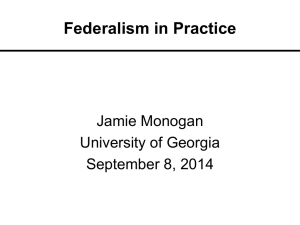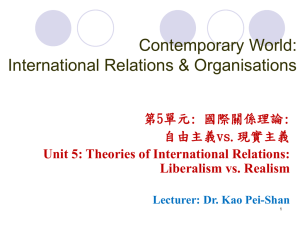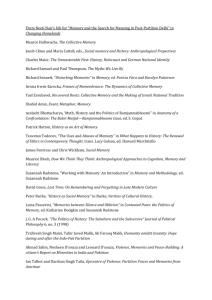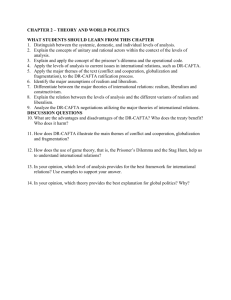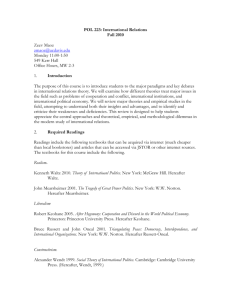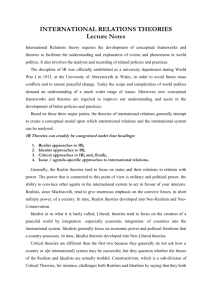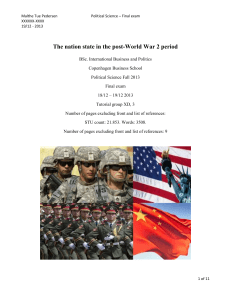Bibliography
advertisement
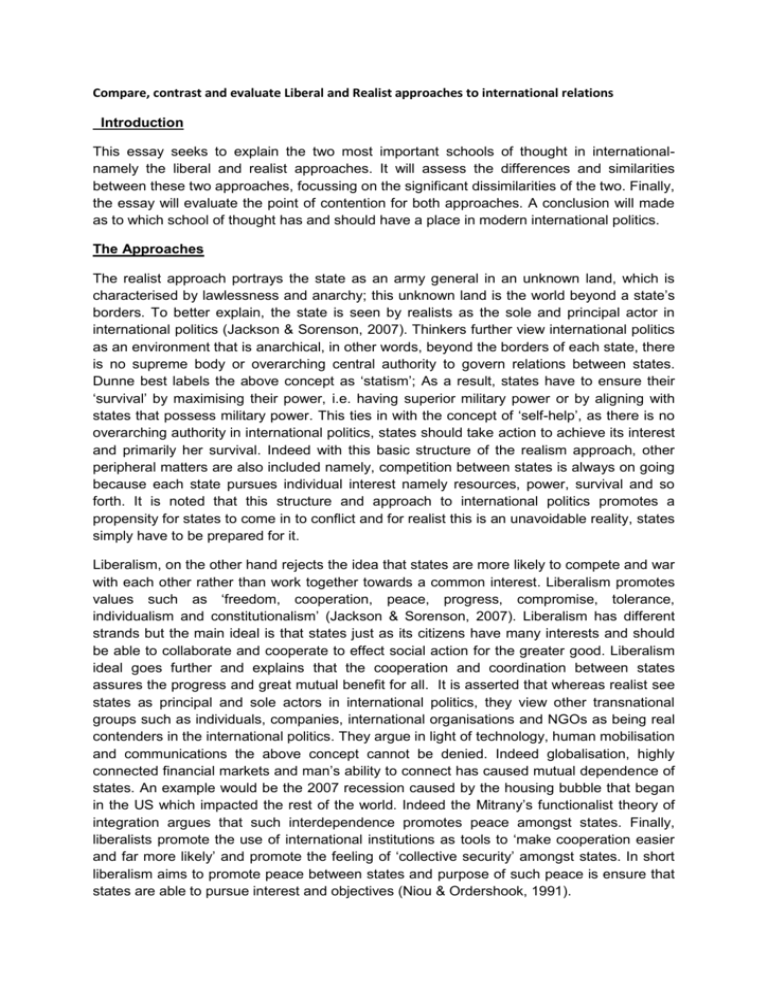
Compare, contrast and evaluate Liberal and Realist approaches to international relations Introduction This essay seeks to explain the two most important schools of thought in internationalnamely the liberal and realist approaches. It will assess the differences and similarities between these two approaches, focussing on the significant dissimilarities of the two. Finally, the essay will evaluate the point of contention for both approaches. A conclusion will made as to which school of thought has and should have a place in modern international politics. The Approaches The realist approach portrays the state as an army general in an unknown land, which is characterised by lawlessness and anarchy; this unknown land is the world beyond a state’s borders. To better explain, the state is seen by realists as the sole and principal actor in international politics (Jackson & Sorenson, 2007). Thinkers further view international politics as an environment that is anarchical, in other words, beyond the borders of each state, there is no supreme body or overarching central authority to govern relations between states. Dunne best labels the above concept as ‘statism’; As a result, states have to ensure their ‘survival’ by maximising their power, i.e. having superior military power or by aligning with states that possess military power. This ties in with the concept of ‘self-help’, as there is no overarching authority in international politics, states should take action to achieve its interest and primarily her survival. Indeed with this basic structure of the realism approach, other peripheral matters are also included namely, competition between states is always on going because each state pursues individual interest namely resources, power, survival and so forth. It is noted that this structure and approach to international politics promotes a propensity for states to come in to conflict and for realist this is an unavoidable reality, states simply have to be prepared for it. Liberalism, on the other hand rejects the idea that states are more likely to compete and war with each other rather than work together towards a common interest. Liberalism promotes values such as ‘freedom, cooperation, peace, progress, compromise, tolerance, individualism and constitutionalism’ (Jackson & Sorenson, 2007). Liberalism has different strands but the main ideal is that states just as its citizens have many interests and should be able to collaborate and cooperate to effect social action for the greater good. Liberalism ideal goes further and explains that the cooperation and coordination between states assures the progress and great mutual benefit for all. It is asserted that whereas realist see states as principal and sole actors in international politics, they view other transnational groups such as individuals, companies, international organisations and NGOs as being real contenders in the international politics. They argue in light of technology, human mobilisation and communications the above concept cannot be denied. Indeed globalisation, highly connected financial markets and man’s ability to connect has caused mutual dependence of states. An example would be the 2007 recession caused by the housing bubble that began in the US which impacted the rest of the world. Indeed the Mitrany’s functionalist theory of integration argues that such interdependence promotes peace amongst states. Finally, liberalists promote the use of international institutions as tools to ‘make cooperation easier and far more likely’ and promote the feeling of ‘collective security’ amongst states. In short liberalism aims to promote peace between states and purpose of such peace is ensure that states are able to pursue interest and objectives (Niou & Ordershook, 1991). Liberalism and realism on face value seem to bear no common ground. However Niou and Ordeshook have succinctly highlighted the concepts both sides seem to agree on. Firstly there is agreement that international politics lacks order and that any structure, corporation and coordination developed in international politics is self-enforcing action on the part of the states. Further both sides recognise the need for states as primary actors in international politics although liberals will argue they are not sole actors whilst realist will argue the opposite. In addition both sides agree that war is a reoccurring feature of an anarchic system. The differences between the approaches is the heart of the debate. We will refrain from using a simplistic approach of comparing the attributes of the approaches. Instead we will employ each schools of thought’s view on certain ideas such as balance of powers, collective security, globalisation, sovereignty and the role of international institutions. The balance of powers theory asserts that when one state gains such power that it threatens weaker states, these states will join together to gain strength and check the powerful state. Realists support this view and believe that when this balance or equilibrium of powers occurs, it deters states from war and hostility. In contrast, Liberals argue that the equilibrium that deters hostility and power politics and truly promotes peace is collective security. Collective security can be explained as states collectively ascertaining the security of all nations and that a threat to one nation’s security is a threat to all nations in that collection of states. These two ideas are perhaps capable of deterring aggression but the liberals can argue that the balance of power doctrine simply promotes an arms race, pushing states to use limited resources to achieve power- (for example United States is a state that invests heavily in its defence compared to other priorities) (Roy, 2012)) whilst if a collective security doctrine is employed, the states can employ these resources to pursue more beneficial objectives instead. Germany is an example of a state directing most of its energies to fulfilling other objectives and has become one of the world’s largest economies. In contrast realists dismiss the collective security concept, as international organisations such as the former League of Nations cannot guarantee collective security. The Westphalian Constitution penned the concept of territoriality, sovereignty and autonomy. Realist may argue that the concept of sovereignty cannot be eroded yet for international institutions such as the United Nation to be truly an authority; states will have to give up some of its sovereignty (Mcgrew, 2011). Liberalist however will argue that these institutions are important and can facilitate coordination between states without becoming a supreme power over these states. However, we look to the European Union to show that such institutions are able to gain considerable power over its member states; hence members like the United Kingdom argue that its parliament in no longer the supreme law making bodyhowever this is debatable. Having evaluated both approaches, the crux of the matter is states may choose to stand alone, using its resources to protect itself and promote is survival and only aligning with other states as an act of ‘balancing of powers’. Alternatively they may choose to eliminate anarchy in international politics by using tools and systems that will impose order and structure which may allow states to focus on economic growth, research, elimination of poverty, development and other important objectives. The answer is not simple, although states with similar ideology may adhere to the international structure based on liberalism, states such as Iran and South Korea may not. In the instance of Iran, it seems that the collective security concept fails in the sense that the collective threats of other states has not deterred from pursuing nuclear weaponry. Rather this example promotes the realism theoryIran seeks to balance out the powers of its opposition and it clearly seeks to ensure its survival as well as pursue power. Conclusion In conclusion, the realist approach is the system that operates, however it is not wrong for states to work towards an ideal system that allows for world peace. After all most individuals wish to eradicate poverty and hunger, some may say it is impossible but it does not stop us from continually trying. Although some view liberalism as a utopian concept, it is possible to develop an international system that considerably reduces world conflict and promotes growth. Bibliography Avik,R. (2012 )‘How Healthcare Spending Strains the U.S. Military’ Online Available at http://www.forbes.com/sites/aroy/2012/03/12/how-health-care-spending-strains-the-u-smilitary/. [Accessed 22 March 2013] Dunne T, ‘Liberalism’ in Baylis J, Smith S & Owens P (eds), The Globalization Of World Politics- An Introduction To International Relations (5th edn, OUP 2011). Dunne T & Schmidt B.C, ‘Realism’ in Baylis J, Smith S & Owens P (eds), The Globalization Of World Politics- An Introduction To International Relations (5th edn, OUP 2011). Emerson M.S. Niou & Peter C. Ordeshook, ‘Realism v Neoliberalism: A formulation’ [1991] AJPS 139. Jackson R & Sorensen G, Introduction to International Relations: Theories & Approaches (3rd edn, OUP 2007). John Wolfowitz, ‘Realism’ Foreign Policy (Washington August/ September 2009). John Gerrad Ruggie, ‘Territoriality and Beyond: Problematizing Modernity in International Relations’ [1993] IO 139. Mcgrew M, ‘Globalisation and Global Politics’ in Baylis J, Smith S & Owens P (eds), The Globalization Of World Politics- An Introduction To International Relations (5th edn, OUP 2011).

